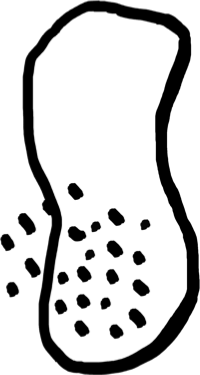Eating Disorder Resources
Eating disorders are beasts. Recovery is NO joke. Individuals suffering from anorexia, bulimia, binge eating disorder, ARFID, and their families need information to make it through this process. They need support… and I’d like to give it to you.
While I was recovering from anorexia as a preteen and again in college, I never thought I would survive. Honestly, I still think of those days and wonder how I made it out alive! And that’s precisely why I made this page– to gather all the information and resources I had drawn from to keep myself steady in recovery or help get me back up on my feet after a relapse (because, unfortunately it is part of the process).
Individuals looking to recover from an eating disorder, their loved ones and family members can all find the following information useful. I’ve included general eating disorder symptoms, possible causes and risk factors of developing an eating disorder, the health consequences, and (my favorite section!) support and eating disorder recovery resources.
As I like to tell my viewers– Stay Safe, stay strong, and stay TUNED into yourselves, ya’ll. We can get through this together!

Susie’s Eating Disorder Story
Blog Posts about Eating Disorders
Awareness & Advocacy Page
Eating Disorder Information
Types of Eating Disorders
Understanding the various types of eating disorders is crucial for raising awareness and providing appropriate support. Here is a detailed list of eating disorders with brief information for each:
Anorexia
Anorexia nervosa is characterized by an intense fear of gaining weight and a distorted body image that leads to restricted food intake, excessive exercise, and severe weight loss. Individuals with anorexia often perceive themselves as overweight even when they are underweight.
Learn More…
Bulimia
Bulimia nervosa involves cycles of binge eating followed by compensatory behaviors such as self-induced vomiting, excessive exercise, or misuse of laxatives. Individuals with bulimia often feel a loss of control during binges and are preoccupied with body shape and weight.
Learn More…
Avoidant/Restrictive Food Intake Disorder (ARFID)
ARFID involves avoiding certain foods or restricting food intake due to a lack of interest in eating, sensory issues, or fears of adverse consequences (such as choking or vomiting). It differs from anorexia in that it is not driven by body image concerns.
Learn More…
Pica
Pica is characterized by the persistent consumption of non-nutritive substances, such as dirt, clay, chalk, or paper. This behavior is inappropriate to the developmental level of the individual and can lead to serious health risks.
Learn More…
Body Dysmorphic Disorder
BDD is characterized by an obsessive focus on perceived flaws in physical appearance, which are often minor or not observable to others. While BDD is not strictly an eating disorder, it frequently co-occurs with eating disorders and can lead to harmful behaviors.
Learn More…
Night Eating Syndrome
NES involves recurrent episodes of eating at night, either after awakening from sleep or by consuming excessive amounts of food after the evening meal. This disorder can lead to disrupted sleep patterns and metabolic issues.
Learn More…
Binge Eating Disorder (BED)
Binge eating disorder is characterized by recurrent episodes of eating large quantities of food, often rapidly and to the point of discomfort. Unlike bulimia, these episodes are not followed by compensatory behaviors. Individuals with BED may feel shame, distress, or guilt about their eating habits.
Learn More…
Other Specified Feeding or Eating Disorder (OSFED)
OSFED includes eating disorders that do not meet the full criteria for any specific disorder but still cause significant distress and impairment. Examples include atypical anorexia (weight is not below normal), purging disorder (purging without binge eating), and night eating syndrome.
Learn More…
Orthorexia
Orthorexia nervosa is characterized by an obsessive focus on eating foods that one considers healthy, often to the exclusion of other food groups. This fixation can lead to nutritional deficiencies and impact physical and mental health. While not officially recognized in the DSM-5, it is increasingly acknowledged by health professionals.
Learn More…
Rumination Disorder
Rumination disorder involves the repeated regurgitation of food, which may be re-chewed, re-swallowed, or spit out. This regurgitation is not due to a medical condition and often occurs within 30 minutes of eating.
Learn More…
Compulsive Exercise Disorder
This disorder involves an obsessive and compulsive need to exercise, often to the detriment of one’s health, social life, and overall well-being. It is frequently associated with anorexia and bulimia.
Learn More…
Diabulimia
Diabulimia is a term used to describe the deliberate manipulation of insulin doses by individuals with type 1 diabetes to control weight. This dangerous behavior can lead to severe short- and long-term health complications.
Learn More…
Treatment Options
Individualized Therapy
Lorem Ipsum Dolor
2010
Nutrition Counseling
Lorem Ipsum Dolor
2017
Treatment Centers
Lorem Ipsum Dolor
2017
Support Groups
Lorem Ipsum Dolor
2017
Hotlines
Lorem Ipsum Dolor
2017
Online Forums
Lorem Ipsum Dolor
2017

Featured In Divi
Sed ut perspiciatis unde omnis iste natus error sit voluptatem accusantium doloremque.
Work







